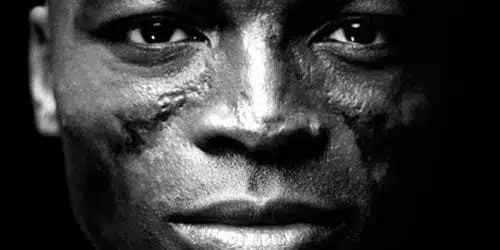
All the accoutrements are in place for an album that portends to celebrate soul: Loosened tie? Check. Vintage microphone? Check. Tinted black and white photograph? Check. Whose visage is that with eyes closed and parted lips? No, not Ryan Shaw. It’s Seal, and just in case the visual cues escaped you, his latest album is entitled Soul.
Is this album really necessary? Well, life is really no better or worse after listening to Soul. It’s a rather innocuous collection. Seal maximizes the contrivances of the project, singing songs popularized by Sam Cooke and Otis Redding with that slightly raspy tone of his, as if his life depended on it. The question that looms over the project is a big ole “Why?”
Seal is not an untalented songwriter and I wonder why he felt the need to mine such well-trod territory. Is he going through a creative drought? Is this simply a contract-fulfilling release (his sixth studio album for Warner Bros.)? I’d like to believe that these songs genuinely inspire him but after the disappointing sales of System (2007), Soul seems like a slightly desperate, commercially low-risk ploy to sell records.
Since Seal’s audience has dissipated from its mid-’90s high, it stands to reason that he’s in search of a new one with Soul. After all, in the age of American Idol, who doesn’t like to hear familiar songs…right? It doesn’t require much work to learn the lyrics. People already know them. Capitalizing on the rampant interpolation of ’60s-soul in contemporary music, I’m sure, must have seemed like a good idea. Bringing in superstar producer David Foster (he of Celebrity Duets) to helm production made sense too but the problem with Soul is that it just seems focus-grouped to death. Perhaps this is the record label’s way of attempting to earn money back lost on System. With the holiday season basically here, I don’t doubt the label heads are counting on Soul to be an impulse purchase on the Wal-Mart check-out line.
For the people that do listen to Soul, Seal might be their entrée to “People Get Ready” and “A Change Is Gonna Come”. While I’d like to think that Seal’s listeners would already know these songs, maybe his target audience is the 14 year-old who dug that Amy Winehouse record (or that grandmother who thinks they just don’t make songs like these anymore). With each new generation further removed from the original versions of these songs – the ones that music aficionados swear by – what is the harm in reintroducing them? Nothing, I guess, so long as the originals are not buried and forgotten. As a child of the ’80s, I knew UB40, Tina Turner, and Simply Red’s versions of “Here I Am”, “I Can’t Stand the Rain”, and “If You Don’t Know Me By Now”, respectively, before the Al Green, Ann Peebles, and Harold Melvin & the Blue Notes versions entered my musical life. Hearing the originals was certainly a revelation and it made me appreciate the talent of the songwriters, admiring how their words live on beyond an artist’s original interpretation. Perhaps someone listening to Soul will have a similar experience with those songs. There is something to be said for authenticity, though, and I just don’t believe Seal when he sings “this is a man’s world” the way I believe James Brown.
Seal actually sounds best on the album’s one wild card. It’s a cover of Deniece Williams’ 1976 hit, “Free”. The bulk of Soul covers the post-doo wop, pre-disco era of R&B, whose generation is bookended by Sam Cooke and Al Green. “Free” was released just beyond that era. Instead of the eastern and southern centers of soul music like Philadelphia and Memphis, “Free” was recorded in the pristine studios of Los Angeles. Whereas gospel can be detected in the Impressions, Otis Redding, and Ben E. King, a completely different strain of soul molds the voice of Deniece Williams (a songbird comes to mind). “Free” is the most successful track on the album because Seal isn’t consciously echoing the heralded soul men of years past. Instead, his nuanced performance is the true definition of what it means to interpret a song. With Seal’s voice, “Free” takes on a life of its own.
The non-cynic in me wants to root for this album, partially because David Foster’s production is quite good. He adorns the tracks with strings and horns and makes Seal’s voice sound pristine. I also want to give Seal a pass for trying but then I think about “Killer”, “Crazy”, “Newborn Friend”, and “Amazing”. I think that he could have tried harder to add to his own legacy rather than ride on somebody else’s. It might be cruel to suggest that Soul feels a little soulless. Cruel, but not entirely incorrect.
